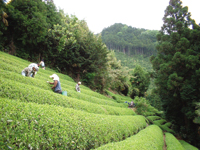Shizuoka
Back to Contents of Issue: April 2005
|
|
|
|
by Brad Burgess |
|
 I went at night, a passenger in the back of an old camper. Outside was the void that countryside offers late travelers, the road forever ending 50 meters ahead, and on this occasion, only reaching further into the unknown. Having met up with Hiromi's family in Nagano by train, I was now on my way for a first visit to her village in Shizuoka where we would spend the next two days. The natural black night emphasized our intimacy in the camper, and after all day skiing and now drinking, we might have been crossing rice-paddy flatlands by the sea. I went at night, a passenger in the back of an old camper. Outside was the void that countryside offers late travelers, the road forever ending 50 meters ahead, and on this occasion, only reaching further into the unknown. Having met up with Hiromi's family in Nagano by train, I was now on my way for a first visit to her village in Shizuoka where we would spend the next two days. The natural black night emphasized our intimacy in the camper, and after all day skiing and now drinking, we might have been crossing rice-paddy flatlands by the sea.
I knew Japan was 75 percent mountainous, so finding myself again surrounded by towering slopes the next morning should not have been surprising to anywhere near the degree it was exciting. But it was that pure black the night before. Without knowing, I had gotten out of the camper and entered a beautiful Japanese home on the side of an incline I wouldn't have dared on skis a few hours before. So mountain climb we did, straight up from the front yard to check on the takenoko. "Bamboo babies" in figurative translation, these bamboo shoots are dug out of the ground with a pick to keep the mountainside from getting too dense with bamboo, as well as for the wonderful side dish they provide when steamed. They will be ripe for the taking variously over the course of the month, all by about the time of the green tea harvest that starts the end of April. On the other side of the yard was the road. It ran along a small river in a narrow valley. There was little bamboo on the far mountain, and instead, rows and rows of trim meter-tall bushes -- practically the entire sides of mountains looking like a landscape architect's colossal fancy. Hiromi said, "When I was a child May smell was tea smell, and the color is such a beautiful light green, and when the mountains turned green, that was my spring." I asked if fires were burning in places on the mountainside, thinking farmers were perhaps clearing land. This was met with a hint of skepticism at my powers of perception by Hiromi's brother. It was only cloud -- just a patch that seemed caught on the branches of the tea. We would be up there, back to help out at harvest time.  No matter how good or courageous a driver you fancy yourself, there is something new again about being driven up and down sharply winding roads on steep mountainsides by people who have done it for years. Ego has me quick to say there were no white knuckles, although it would take more than a few days to get used to it. Now back for the harvest, this roller coaster was part of the daily experience, and I wasn't sure if I would even want to drive given the chance. No matter how good or courageous a driver you fancy yourself, there is something new again about being driven up and down sharply winding roads on steep mountainsides by people who have done it for years. Ego has me quick to say there were no white knuckles, although it would take more than a few days to get used to it. Now back for the harvest, this roller coaster was part of the daily experience, and I wasn't sure if I would even want to drive given the chance.
The tea-leaf picking itself is standard monotonous labor. Gloves protect your hands. However, the work can take a toll on your back. But just as people love to pick their own strawberries, far from suffering it as a daily chore, from time to time nature's grind -- the other life -- is a joy to experience. And being thoroughly engulfed in such lush green with spectacular views is a big part of it. Most of the green tea production is done on flatter regions of Shizuoka, where the scenery isn't spectacular, but access is better. Quality tea requires year-round care. But for most tea farmers in mountain villages like this one, it's a second job, with family members gathering to help with the harvest. Hiromi's father, for example, grew tea and other crops. "When my dad died they could have sold the farm, but they thought if they immediately gave it up, it would have been sad," Hiromi said. They also didn't sell because there is little interest in the tea business and the sale would bring in next to nothing. "It isn't such a stable income because the weather or bugs can affect the outcome, and not really lucrative anyway, so children aren't generally expected to carry it on. However, many will do it as a side job." Hiromi left Shizuoka for Tokyo when she was 18, and has been there ever since. We returned to Tokyo quite happy having put in "working time" on the mountainside. I have since heard that while Shizuoka is famous for its green tea, it offers tea-picking programs, providing the experience to anyone who wants it. |
|
Note: The function "email this page" is currently not supported for this page.





